UK storms: Homes left without power and travel disrupted
- Published
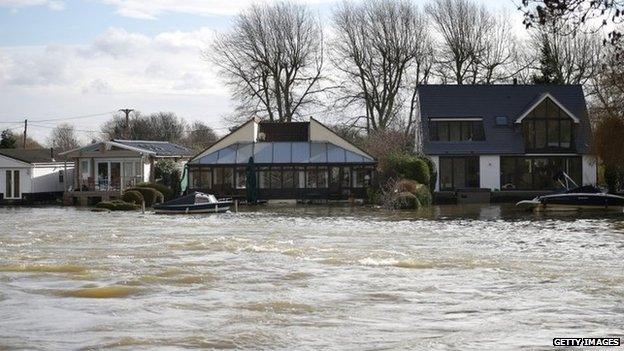
Staines-upon-Thames has seen severe flooding in the past week
Tens of thousands of homes are without power and there is renewed travel disruption after hurricane-force winds battered the UK on Wednesday.
There was some respite on Thursday but forecasters warn that an incoming storm from the Atlantic could be even worse than Wednesday's severe weather.
Sixteen severe flood warnings remain, external for Berkshire, Surrey and Somerset - all already hit by severe flooding.
Train services in parts of the UK are cancelled and some roads are closed.
It comes after parts of the transport network struggled to cope during Wednesday's severe weather, which closed roads and caused delays and cancellations to rail services.
In the Commons, Transport Secretary Patrick McLoughlin said £61m would be spent to help repair the damage - but Labour said at least £118m was needed for rail repairs alone.
UK storms and floods
5,800
homes flooded since December
130,000
homes lost power overnight Wednesday
-
112mph wind gusts recorded
-
319mm rain fallen in Thames Valley since mid-December
-
Wettest January since 1776
In other developments:
A pensioner thought to have been electrocuted while trying to move a fallen tree which had brought down power cables has been named as Roger Hayward from Bremhill, Wiltshire
A 33-year-old man died in a two-car crash in Macclesfield. Police said they found a tree partially in the road when they arrived at the scene
David Cameron promised further visits to flood-hit communities, ahead of the first meeting of a Cabinet committee on flood recovery
Deputy Prime Minister Nick Clegg rejected calls for cash to be diverted from the UK's £11bn foreign aid budget to help those affected
Mr McLoughlin told MPs it was "important we ensure the [transport] network is resilient to threats of this nature in future"
Work is beginning to clear debris, fallen trees and other damage caused by 100mph winds that battered Wales
A man was knocked unconscious when he was hit by a fence panel as high winds hit Greater Manchester
A lightning strike has knocked out water supplies to 66 homes in Cornwall
Homes across Staffordshire and Cheshire are still without power
The storms have caused a trail of damage across Cumbria
The River Severn has reached record levels in Worcester but it is not expected to overflow

Property was damaged during Wednesday's hurricane-force winds
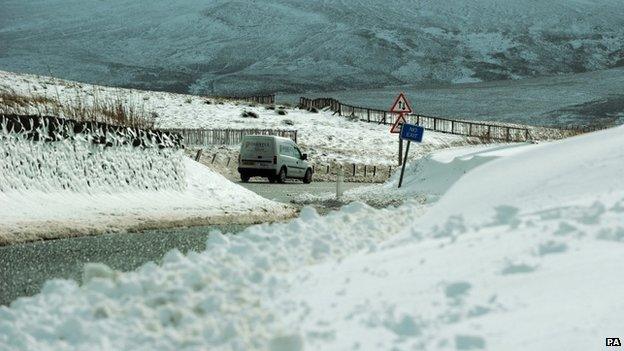
Some parts of the UK have seen snowy weather and further snow is expected to fall on Friday
.jpg)
The BBC's Sian Lloyd sent this photo from the top of Worcester Cathedral
Power out
Gusts of up to 112mph were recorded on Wednesday, with Wales bearing the brunt of the hurricane-force winds, but a rare "red warning" for wind is no longer in place.
The Energy Networks Association, representing UK energy companies, said about 80,000 homes and businesses remained without electricity.
The organisation's spokesman, Tim Field, said 60,000 were without power across Wales, while the remainder were spread across northern and south-west England and the West Midlands.
He said engineers had restored power to 145,000 customers since the storms hit on Wednesday, with 68,000 restored overnight.
"The pylons and the wires themselves are very resilient to strong winds. It is other airborne objects and debris - like uprooted trees - that cannot hold on in those sorts of 100mph winds. It is these things that are causing power lines to come down," he said.
Engineers will work throughout the day to try to restore power by this evening to those customers still without, he added.
Mark Bradshaw, of East Ilsley, Berkshire, said he had experienced three power cuts in 12 hours. "With a seven-week-old baby, we are really worried that we cannot heat or sterilise her bottles as we have no gas," he said.
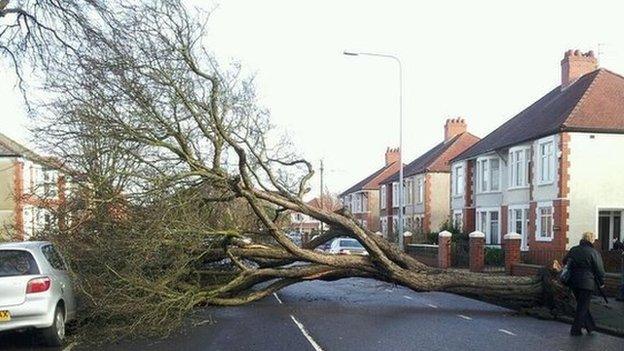
Drivers are being warned to take care on the roads
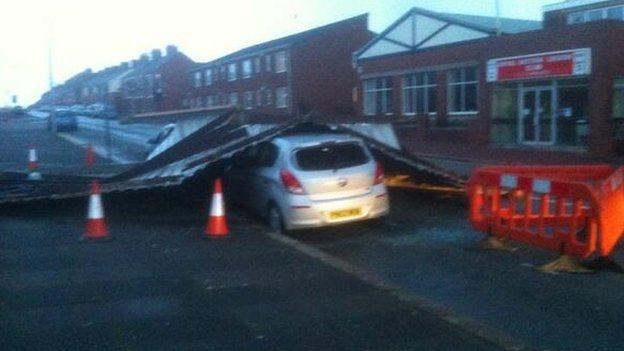
Two cars in Barrow, Cumbria remain under metal sheeting after storms left a trail of damage
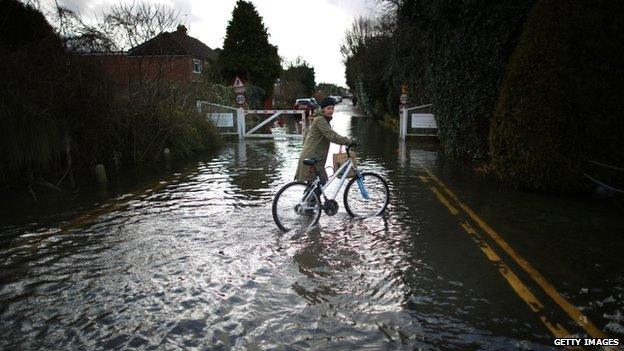
Some people adopted other ways of travelling through floodwater
Travel problems include the following:
Virgin Trains is warning all services are subject to heavy delays, diversions and cancellations, external
Poor weather conditions are causing disruption to services, external throughout Wales
Services between Bridgwater and Taunton and Taunton and Plymouth/Penzance are affected, external
Damage to power lines is affecting services in north-east England until further notice, external
Routes in north-west England are being disrupted because of flooding and other obstructions, external
First Great Western services are severely disrupted, external because of flooding. Services affected include London Paddington to Reading and Oxford
Services between Staines and Windsor and Eton Riverside are cancelled, external and a replacement bus service is running
The line between Eastleigh and Fareham is likely to be closed for much of February following a landslip, external
Some Southeastern, external and Southern, external trains are affected by landslips from previous storms
Disruption caused by the storm-stricken Dawlish line, external along the Devon coast continues but Mr McLoughlin said trains were expected to start running again around 18 March
Some roads are closed because of flooding. See BBC Travel News for a full picture
Snow and ice in western and northern parts of Northern Ireland are making driving conditions difficult for a second day
Hundreds of passengers on an East Coast main line train from Kings Cross to Edinburgh spent several hours stranded in north Yorkshire on Wednesday night after it lost power in the high winds.
Sophie Cunningham was on another train which was stuck in the area for five hours and said emergency heating and lighting lasted for just 30 minutes.
She described the situation as "grim", saying it was "ice cold" and "like standing on the side of the track without the window".
The Met Office has issued various yellow "be aware", external rain, wind, ice and snow warnings for many parts of the UK on Thursday.
And BBC Weather's John Hammond warned the incoming storm from the Atlantic on Friday will be "every bit as intense, if not more" than Wednesday's.
"It looks like being the wettest winter on record and the groundwater has got nowhere to go. The ground is like a sponge, the sponge is full to overflowing. What we don't need is more rain. [But] what we're going to get is another storm."
Snow expected
Forecasters are also warning of the possibility of significant snowfall in Northern Ireland, southern Scotland and northern England on Friday.
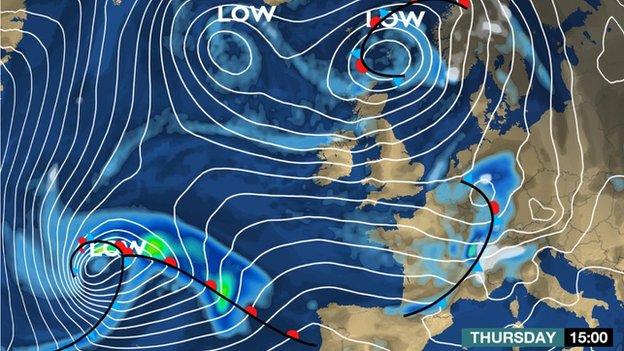
Another storm is waiting in the wings in the Atlantic and is due to arrive on Friday, say BBC forecasters
As well as 16 severe flood warnings, the Environment Agency has also issued about 360 less serious flood warnings and alerts, external, mostly in southern England and the Midlands.
Hundreds of members of the armed forces are continuing to help those affected by the flooding and 2,000 remain ready to help.
Alison Baptiste of the Environment Agency: ''It is horrible being flooded...it is completely understandable people are angry''
Environment Agency programme director Toby Willison said many rivers in southern England were at their highest recorded levels.
"This is an exceptional event, it was the highest rainfall in January since 1776 and we think it is likely December, January and February will be the highest for 250 years," he added.